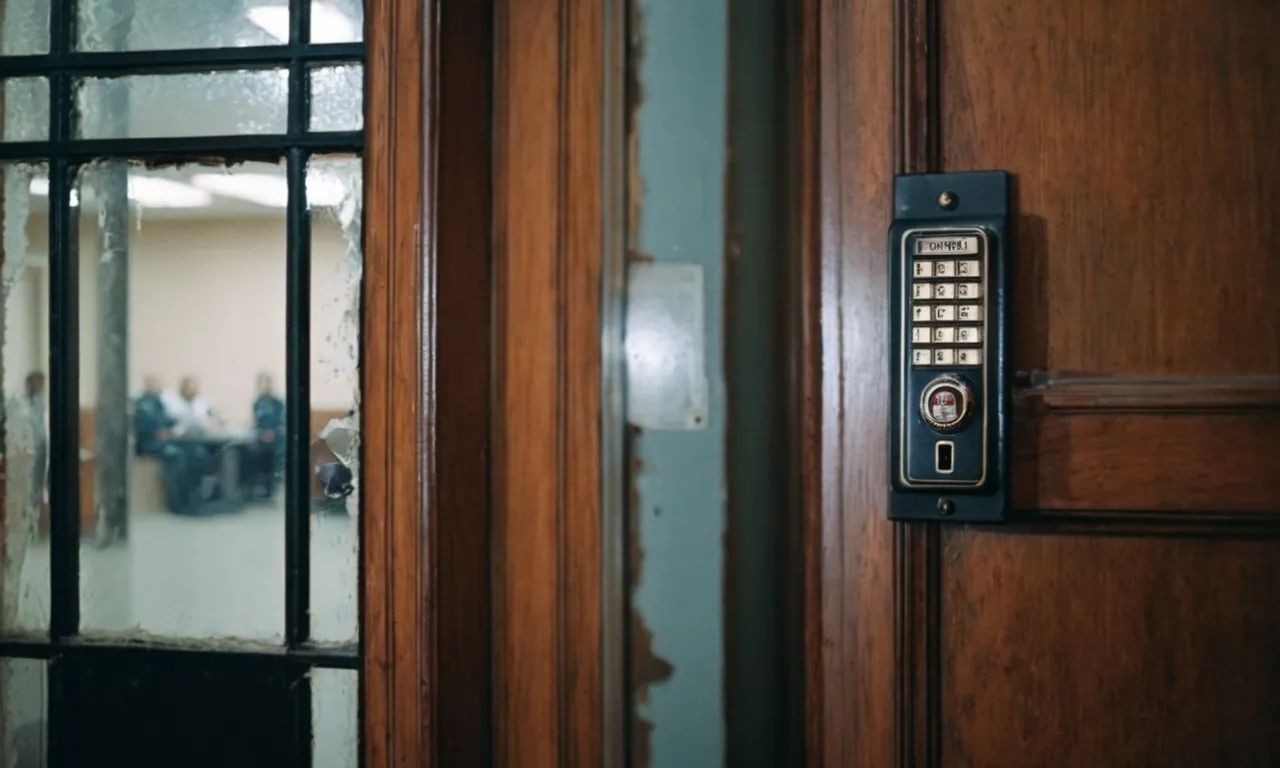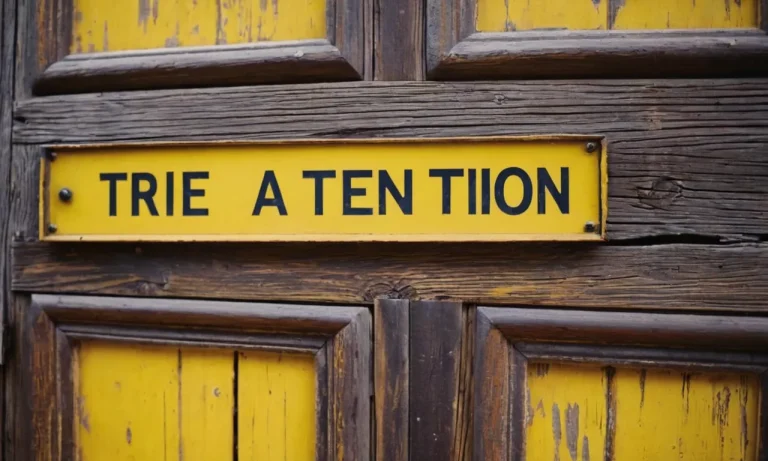When Can Police Legally Break Down Your Door?
Having police break down your door can be a terrifying and traumatic experience. Most people want to avoid this scenario at all costs. So when can police legally break into your home without a warrant or your permission?
If you’re short on time, here’s a quick answer to your question: Police can legally break down your door if they have probable cause to believe that critical evidence is being destroyed or someone inside is in imminent physical danger and needs emergency aid.
In this comprehensive guide, we’ll explain when police have the legal authority to force entry into your home without a warrant. We’ll cover exigent circumstances, hot pursuit, community caretaking, and other exceptions to the Fourth Amendment’s warrant requirement.
We’ll also provide tips on how to react if the police do break down your door and what recourse you may have.
Probable Cause and Exigent Circumstances
What is Probable Cause?
Probable cause is a legal standard that refers to the reasonable belief that a crime has been or is being committed, based on facts and circumstances. It is a necessary requirement for law enforcement officers to obtain a search warrant or make an arrest.
In the context of breaking down a door, probable cause means that the police have enough evidence to reasonably believe that there is evidence of a crime or a dangerous individual inside the premises.
What are Exigent Circumstances?
Exigent circumstances are situations that require immediate action by law enforcement because waiting for a search warrant would result in the loss of evidence, danger to the public, or the escape of a suspect. In such cases, the police may be allowed to break down a door without a warrant.
However, the circumstances must be urgent and compelling enough to justify the intrusion without prior judicial approval.
Examples of Exigent Circumstances
There are several situations where exigent circumstances may justify the police breaking down a door. Some examples include:
- Hot pursuit: If the police are chasing a suspect who enters a building, they may be allowed to break down the door to apprehend the suspect.
- Imminent threat: If there is an immediate threat to someone’s life or safety inside a property, the police may break down the door to prevent harm.
- Emergency situations: If there is a risk of destruction of evidence, such as the disposal of drugs or explosives, the police may be justified in breaking down a door to preserve the evidence.
It is important to note that the specific circumstances and laws can vary depending on the jurisdiction. Therefore, it is always advisable to consult with a legal professional for guidance tailored to your specific situation.
For more information on the topic, you can visit https://www.law.cornell.edu/wex/probable_cause or https://www.legalmatch.com/law-library/article/exigent-circumstances.html.
Hot Pursuit
Hot pursuit is a legal concept that allows police officers to enter a premises without a warrant or the owner’s consent. It is typically invoked when officers are actively pursuing a suspect who is attempting to flee or escape.
The idea behind hot pursuit is to prevent the suspect from getting away and potentially harming others or destroying evidence. However, there are specific requirements that must be met in order for police to legally break down your door in a hot pursuit situation.
Requirements for Hot Pursuit
In order for hot pursuit to be considered legal, there are several requirements that must be met. First and foremost, the police must have probable cause to believe that a crime has been committed and that the suspect is inside the premises.
This means that they must have sufficient evidence to support their belief that the suspect is present and that waiting to obtain a warrant would result in the suspect escaping or evidence being destroyed.
Secondly, the pursuit must be considered “hot” in nature, meaning that it is ongoing and immediate action is necessary to apprehend the suspect. If the pursuit has cooled off or there is no immediate threat to public safety, the police may be required to obtain a warrant before entering the premises.
Additionally, the police must announce their presence and purpose before breaking down the door. This is to ensure that the occupants are aware that it is the police who are entering the premises and not an intruder.
Failure to properly announce themselves can lead to legal complications and may result in evidence being suppressed in court.
Factors Considered by Courts
When determining the legality of a hot pursuit entry, courts will consider several factors. These include the seriousness of the crime being investigated, the potential harm to the public if the suspect is not apprehended immediately, and the likelihood that the suspect will escape or evidence will be destroyed if the police do not act quickly.
It is important to note that each case is evaluated on its own merits, and the specific circumstances surrounding the hot pursuit entry will be taken into account. Courts will also consider whether there were any less intrusive means available to apprehend the suspect, such as obtaining a warrant or waiting for the suspect to exit the premises voluntarily.
For more information on hot pursuit and the legalities surrounding police entry without a warrant, you can visit www.law.cornell.edu. This website provides a comprehensive overview of the legal principles and case law related to hot pursuit.
Community Caretaking Function
When it comes to the question of when police can legally break down your door, one important factor to consider is the community caretaking function. This function allows law enforcement officers to enter a private residence without a warrant in certain situations where their main objective is to ensure the safety and well-being of the community.
Rendering Emergency Aid
Under the community caretaking function, police officers can enter a private residence without a warrant if they have a reasonable belief that there is an emergency situation and someone inside the residence is in need of immediate assistance.
This could include situations such as a medical emergency, a fire, or a potential threat to someone’s life.
In these cases, the police have the authority to break down the door if necessary to provide the necessary aid and ensure the safety of those involved. It is important to note that the police must have a reasonable belief that there is an emergency situation and that their actions are necessary to prevent harm or further injury.
Preventing Harm to Others
Another circumstance in which police may legally break down your door under the community caretaking function is when they have a reasonable belief that someone inside the residence poses a threat to the safety of others.
This could include situations where there is a known or suspected violent offender inside the residence or where there is a risk of imminent harm to others.
However, it is crucial to understand that the police must have sufficient evidence or information to support their belief that there is a threat to the safety of others. They cannot simply enter a private residence without any justification or suspicion.
In both cases, it is important for law enforcement officers to exercise judgment and use the least intrusive means necessary to accomplish their objectives. They should prioritize the safety and well-being of the community while respecting the rights and privacy of individuals.
For more information on the legal guidelines surrounding when police can break down your door, you can visit reputable legal websites such as Cornell Law School or consult with a legal professional who can provide you with the most accurate and up-to-date information.
Consent Searches
When it comes to the legality of police officers breaking down your door, one important factor to consider is whether or not consent was given for a search. Consent searches occur when individuals voluntarily allow law enforcement to search their premises without a warrant.
While these searches can be a useful tool for police investigations, there are specific requirements that must be met for consent to be considered valid.
Voluntary Consent Requirements
For consent to be considered voluntary, it must be given freely and without coercion or intimidation. This means that the individual giving consent must do so of their own free will, without feeling pressured or threatened by the police.
The consent must also be specific, meaning that the individual understands what they are consenting to and that they have the right to refuse the search if they choose to do so.
It’s important to note that police officers do not have to inform individuals of their right to refuse consent. However, if an individual does refuse consent, the police cannot proceed with the search unless they have a valid search warrant or another legal justification.
Coercion and Intimidation
While voluntary consent is the ideal scenario for a search, there are cases where police officers may use coercion or intimidation tactics to obtain consent. This can include using threatening language, making false statements, or creating a sense of fear or urgency.
If it can be proven that consent was not given freely and was instead the result of coercion or intimidation, any evidence obtained during the search may be deemed inadmissible in court.
It’s important for individuals to understand their rights and not feel pressured to give consent if they do not wish to do so. If you believe your rights were violated during a consent search, it is advisable to seek legal counsel to determine the best course of action.
For more information on consent searches and your rights, you can visit websites such as ACLU or Department of Justice.
What to Do During and After a Warrantless Search
Safely Interacting with Police
During a warrantless search, it is important to remain calm and cooperative when interacting with the police. While it may be frustrating to have your privacy invaded, getting confrontational or argumentative can escalate the situation and potentially lead to legal trouble.
Remember that the police are just doing their job, and it is best to comply with their instructions to ensure your safety and avoid any unnecessary complications.
If you believe the search is illegal, you have the right to ask the police for their identification and the reason for the search. Politely ask if they have a warrant, and if they do not, you can calmly state that you do not consent to the search.
However, it is crucial to avoid any physical resistance or obstruction, as this can result in criminal charges.
Documenting Damage and Gathering Evidence
If the police break down your door during a warrantless search, it is essential to document any damage caused. Take photographs or videos of the broken door, damaged locks, or any other property that has been affected. This evidence will be valuable if you decide to take legal action later on.
In addition to documenting physical damage, it is also important to gather any evidence that may support your claim of an illegal search. This could include witness statements, surveillance footage, or any other relevant information.
The more evidence you can gather, the stronger your case will be if you choose to pursue legal avenues.
Filing a Lawsuit
If you believe that your rights were violated during a warrantless search, you have the option to file a lawsuit against the police department involved. It is advisable to consult with an attorney who specializes in civil rights or constitutional law to guide you through the process.
When filing a lawsuit, you will need to provide evidence of the illegal search and any damages you suffered as a result. This could include medical bills, repair costs, or emotional distress. Your attorney will help you navigate the legal system and ensure that your rights are protected throughout the process.
It is important to note that laws regarding warrantless searches may vary depending on your jurisdiction. Consulting with a legal professional will help you understand the specific laws and regulations that apply to your situation.
For more information on your rights during a warrantless search, you can visit ACLU.org or Cornell Law School.
Conclusion
Police breaking down your door without a warrant is legal only in very limited circumstances. These narrow exceptions exist to allow police to prevent imminent harm or destruction of critical evidence when urgently needed and no warrant can be obtained in time.
However, the exceptions are complex, and police do sometimes overstep their authority.
If officers forcibly enter or search your home without a warrant, it’s wise to cooperate in the moment to avoid escalation or harm. But you also have the right to consult an attorney and potentially seek compensation if the police violated your Fourth Amendment rights.
With the proper documentation and evidence, you may have a strong civil liberties case.







